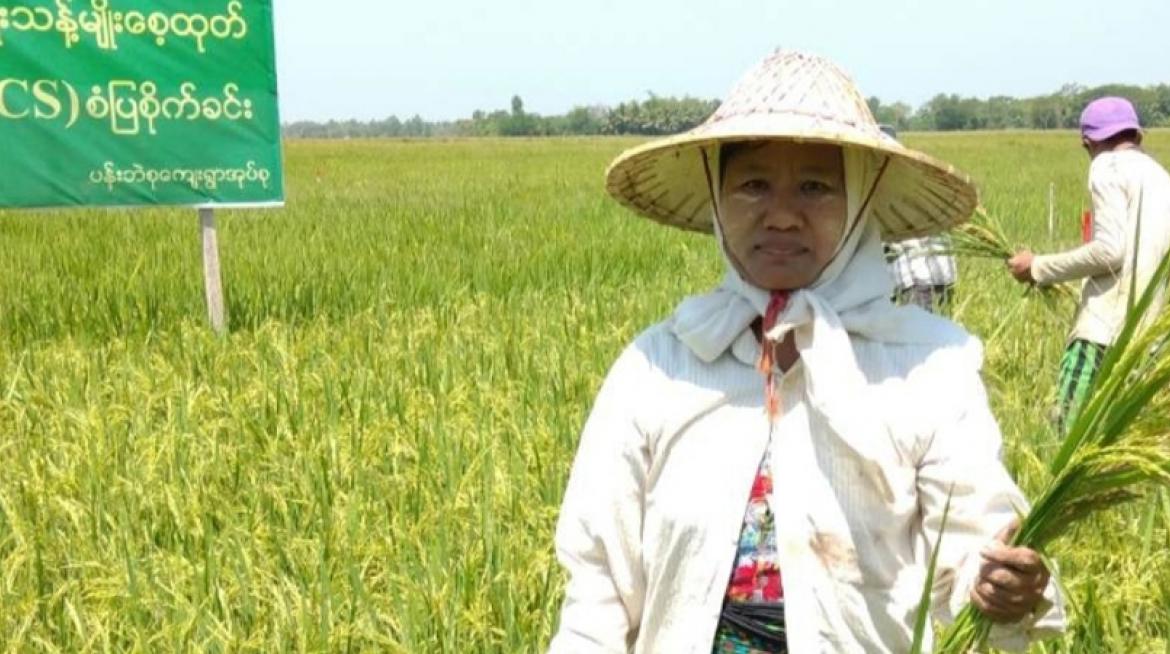
Myanmar’s economy relies heavily on agriculture with the sector contributing to more than 35 per cent of the country’s gross domestic product (GDP). Rural agribusinesses play a vital role in this.
Today, to celebrate the International Day of Rural Women, we are proud to present our inspiring seed grower Daw Kyin Saing from Kyaiklat Township.
Living in Pa Be Su Village, Kyaiklat township, Ayeyarwady Delta Region, Daw Kyin Saing’s main livelihood is based on agriculture, and particularly on seed production. Out of 23 seed growers, Daw Kyin was selected through a competitive process to participate in the Rice Seed Sector Development (RSSD) project’s 2019 co-incentive grant scheme. The RSSD project initiated the scheme with a USD5,000 grant for each seed grower with a minimum of 20 per cent contribution from each to develop their seed business. When Kyin received the grant, she bought a Kubota Tractor (50 HP) on a three-year plan with three instalments. The tractor cost USD20,480 (MMK30,720,000) and the initial payment was made with RSSD grant. Daw Kyin Saing started the tractor rental business in mid-January 2020. Her tractor could help 120 farmers with the preparation of more than 1,000 acres of summer paddy. She said, "RSSD seed production and business management training is very useful to me. In the past, I just recorded income and expenses without separating accounts. At the time, I didn’t know about the depreciation of assets. Today, I have learnt basic accounting and record-keeping systems that have helped me run my seed business and tractor rental business very well". So far, she was able to make MMK13,700,000 in net profit from tractor rental services.
 With a strong dedication to agriculture development in the region, she also helped farmers expand the production of quality seed production and worked to empower her peer seed growers. In recognition of her efforts, the Myanmar Rice Federation awarded Daw Kyin Saing the prize of the ‘Kyaiklat Township Leader: Outstanding Farmer for 2019’.
With a strong dedication to agriculture development in the region, she also helped farmers expand the production of quality seed production and worked to empower her peer seed growers. In recognition of her efforts, the Myanmar Rice Federation awarded Daw Kyin Saing the prize of the ‘Kyaiklat Township Leader: Outstanding Farmer for 2019’.
As an outstanding agribusiness entrepreneur, Daw Kyin Saing was invited to participate in a Facebook live stream discussion hosted by the State Counsellor Office on 18 June 2020. The discussion focused on the impacts of COVID-19 on the agriculture sector. It was chaired by the State Counsellor Daw Aung San Su Kyi and Kyin was one of the participants, along with the Union Minister Dr Aung Thu (Ministry of Agriculture, Livestock and Irrigation) and U Ye Min Aung (Chairman of Myanmar Rice Federation).
 “I faced many challenges in renting the tractor to neighbouring farmers due to the COVID-19 restrictions of movement. The skilled tractor drivers I hired returned to their hometowns in the Dry Zone due to the situation. I, therefore, had to cooperate with youths in the villages who had attended mechanic training and continued to rent the tractor to smallholder farmers with a discounted rate or consignment payment terms. In this way, I was able to maintain the business’, Kyin said. Throughout the live stream (304K views), Kyin confidently shared her experience, thoughtful insights, and challenges that farmer communities face. The State Counsellor congratulated Daw Kyin on her smart management in addressing the challenges of the COVID-19 pandemic while keeping her agribusiness running successfully.
“I faced many challenges in renting the tractor to neighbouring farmers due to the COVID-19 restrictions of movement. The skilled tractor drivers I hired returned to their hometowns in the Dry Zone due to the situation. I, therefore, had to cooperate with youths in the villages who had attended mechanic training and continued to rent the tractor to smallholder farmers with a discounted rate or consignment payment terms. In this way, I was able to maintain the business’, Kyin said. Throughout the live stream (304K views), Kyin confidently shared her experience, thoughtful insights, and challenges that farmer communities face. The State Counsellor congratulated Daw Kyin on her smart management in addressing the challenges of the COVID-19 pandemic while keeping her agribusiness running successfully.
Nowadays, she collaborates with eight seed growers (1 F, 7 M) to produce quality seed in her village. She also provides training to other neighbouring seed growers and shares her knowledge. Moreover, she manages farming processes to produce quality seeds in order to obtain high yields and actively get linked to remunerative markets like seed companies and farmers in Ayeyarwady Delta.
The LIFT-funded Rice Seed Sector Development Project in the Ayeyarwady Delta, Myanmar, implemented by Welthungerhilfe (WHH) in partnership with Wageningen University Research and Myanmar Rice Federation, supports seed growers like Daw Kyin Saing in the Ayeyarwady Region to increase the production, quality and uptake of seed to reach a wider market.
The RSSD project is improving female and male farmers’ access to and uptake of quality seed of improved and well-adapted varieties. The project aims to strengthen the rice seed value chain, improve the performance of different operators and service providers, increase demand orientation, and improve coordination among seed value chain actors.


